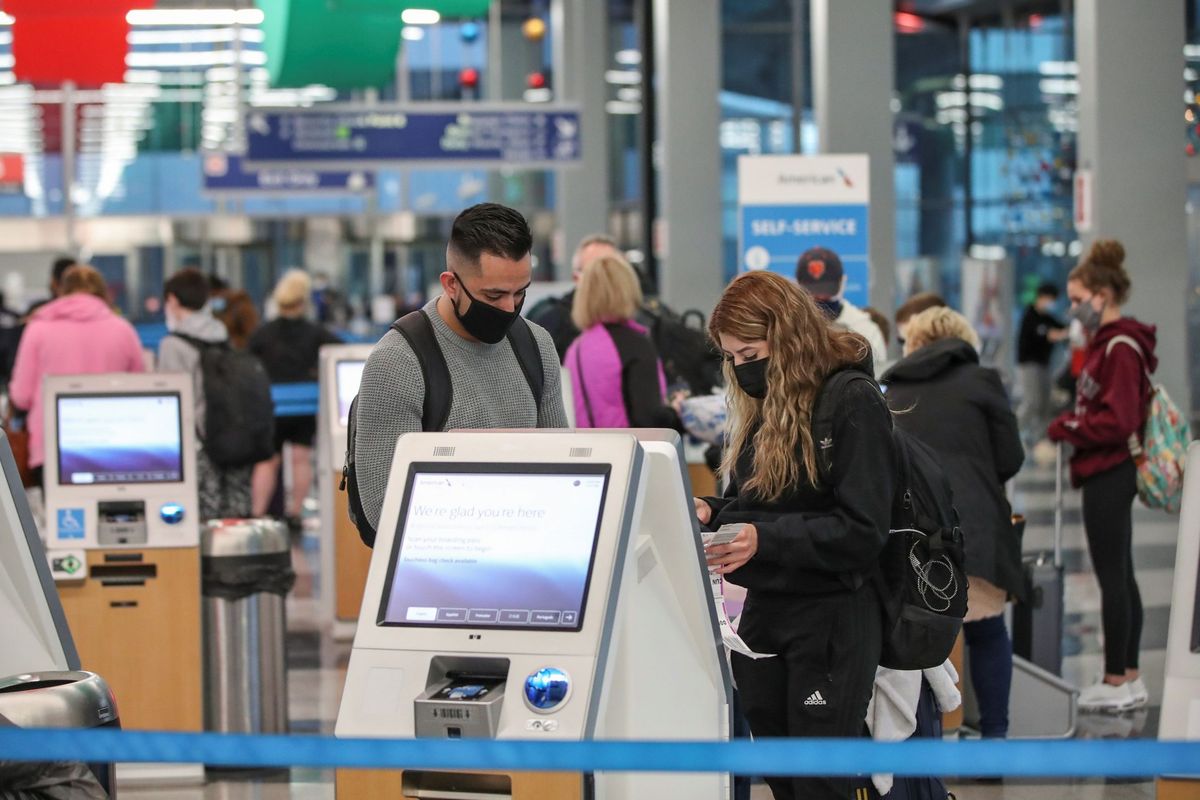Airlines see holiday surge despite a record increase in COVID-19 cases

A few minutes every morning is all you need.
Stay up to date on the world's Headlines and Human Stories. It's fun, it's factual, it's fluff-free.
The surge in the number of people traveling did bring some much needed good news to the airline industry, allowing cash-strapped airlines the opportunity to increase their schedules.
Despite health and safety warnings from the Centers for Disease Control and Prevention (CDC), the days surrounding Thanksgiving turned out to be some of the busiest air-travel days in the United States since the COVID-19 pandemic began in the country back in March.
The Transportation Security Administration (TSA) announced that the ten-day period from November 20 to November 29 saw 9.5 million passengers screened, around 35%-45% of the number of travelers seen during the same time frame in 2019. Four individual days within that period saw more than one million travelers screened.
This comes as the coronavirus is surging across the country, with numerous states reporting a record number of cases. On November 19, the CDC urged Americans to avoid traveling over the Thanksgiving holiday.
The surge in the number of people traveling did bring some much needed good news to the airline industry however, allowing cash-strapped airlines the opportunity to increase their schedules. American Airlines said it increased its schedule by about 15%, or 500 flights, during Thanksgiving week.
The airline industry in the pandemic
The airline industry was possibly one of the hardest hit industries during the pandemic, but it suffered uniquely in that it faced problems on two fronts.
It saw clientele turn away due to the obvious health risks of being in proximity with strangers for hours on end, but the economic recession also meant there was less money that people had to spend on flying in the first place.
This came as a sort of one-two punch to the industry, which has experience dealing with health crises and financial crises individually, but not together.
“I’ve seen some crises in my time,” said Boet Kreiken, the executive vice president for customer experience at KLM, a Dutch carrier. “The Iraq War, 9/11, Sars, the Icelandic volcano eruption. I know in the gut what that feels like. But this was something else. I was staring at the chart and got so involved in thinking about the consequences that the others had to tell me twice: ‘Boet, start the meeting!’”
In the initial weeks of the pandemic, people largely stopped flying, with April 14 seeing record low numbers of passengers, with the TSA reporting that travel on that day was just 4% of what it had been on the same day a year earlier. By the time May rolled around, around 65% of passenger planes were put into storage, the data and analytics company Cirium reported.
The massive downturn in air travel was not kind to airlines, with estimates that the industry as a whole would be subject to losses of US$84.3 billion this year.
The US industry received US$25 billion in a mix of grants and loans from the CARES act. This money was allocated in April as a bailout for airlines and required that airlines not enact major employee layoffs or salary cuts. European airlines received more than EU€30 billion in bailouts, while Asia’s Singapore Airlines received around US$13 billion.
But, after months of the pandemic, the bailout money began to run out. In September, United and American Airlines started moving ahead with furloughs affecting more than 32,000 US workers.
A chance at recovery
With the prospects of a vaccine on the rise, returning to the rates of travel that the industry saw in 2019 might be possible by late 2021, investors estimate.
The question of whether demand will return to normal in a post-COVID world, though, is unknown.
“COVID gives companies a reason to rethink travel expenses,” said Jeff Pelletier, an executive at the Dallas-based analytic firm Airline Data. “Not every company will cut back, but some will. They’ll figure they’d rather spend a couple of bucks on a zoom meeting instead.”
The increased publicity around the increased safety procedures put into effect by airlines appears to have led travelers to feel more comfortable flying now than they were in the early months of the virus, even without a vaccine having yet been distributed. But demand has not yet risen to even half of the demand seen in previous years, in large part due to health experts advising against unnecessary travel.
Uncertainty ahead
Airlines recognize that the landscape is changing and will continue to change in the months and years ahead, but the timeline for a return to normalcy is uncertain at best.
With no new stimulus package, airlines have been forced to lay employees off without any concrete plans to rehire them.
Though the brief spikes in plane travel seen over Thanksgiving week and likely to continue throughout the winter holidays have provided some relief to a hurting industry, any serious relief would have to see the number of passengers approaching what it was before the pandemic.
Even the industry itself isn’t specifically encouraging travel. “Do we want to see them travel? Yes, but only if it’s safe for them,” said Airlines for America chief executive officer Nick Calio. “There’s a variety of factors involved in that for each individual traveler.”Despite the uncertainty, one thing seems clear: it will be a long time until flights look the way they did a year ago.
Have a tip or story? Get in touch with our reporters at tips@themilsource.com




Comments ()